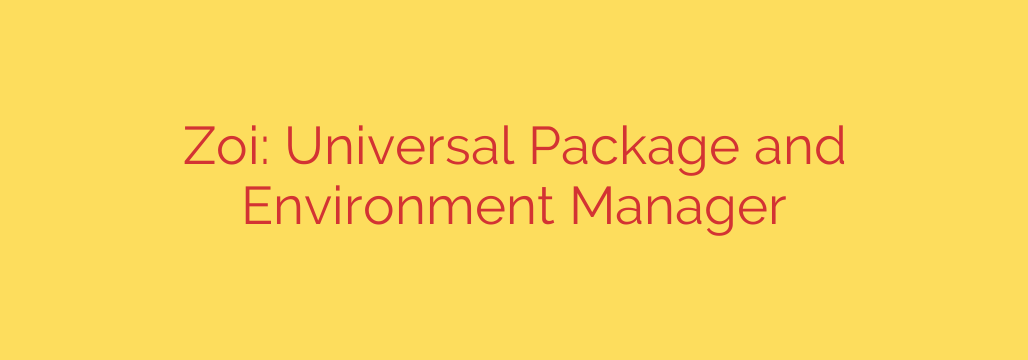
Unify Your Development Workflow: The Rise of Universal Package and Environment Managers
In modern software development, managing dependencies and environments can feel like a full-time job. Developers often juggle a dizzying array of tools for different languages: pip and venv for Python, npm and nvm for Node.js, Cargo for Rust, and countless others. This tool sprawl creates friction, complicates project setup, and leads to the dreaded “it works on my machine” problem.
What if you could manage all your project dependencies and environments with a single, unified tool? A new generation of universal managers is emerging to solve this exact problem, offering a streamlined approach that promises to give developers back their most valuable asset: time.
The Core Problem: Fragmentation and Complexity
The challenge isn’t that individual package managers are bad—they are excellent at what they do for their specific ecosystems. The problem is the cumulative complexity when projects become polyglot, involving multiple languages and frameworks.
A typical web application might use a Python backend, a JavaScript frontend, and perhaps some Rust for performance-critical components. To get this project running, a developer needs to:
- Create and activate a Python virtual environment.
- Use
pipto install dependencies fromrequirements.txt. - Switch to the correct Node.js version using
nvm. - Run
npm installto get packages frompackage.json. - Ensure the right Rust toolchain is active to build with
cargo.
This manual, multi-step process is not only tedious but also highly error-prone. It complicates onboarding new team members and makes continuous integration (CI/CD) pipelines fragile and difficult to maintain.
A New Paradigm: One Tool, One Configuration
Universal environment managers introduce a powerful, declarative approach to this chaos. Instead of running a series of imperative commands, you simply define your entire project environment in a single configuration file. This file acts as the single source of truth for your project’s setup.
This configuration file, often in a simple format like TOML, allows you to specify:
- The languages and versions your project needs (e.g., Python 3.11, Node.js 20.x).
- The package managers to use for each language.
- A complete list of dependencies for every part of your application.
With this file in place, setting up the entire development environment is reduced to a single command. The universal manager reads the configuration, automatically creates an isolated environment, installs the correct language versions, and fetches all the specified packages.
Key Advantages of a Unified Approach
Adopting a universal manager offers significant benefits for individual developers and entire teams, fundamentally changing how projects are built and maintained.
- Radical Simplicity: The most immediate benefit is the reduction in cognitive load. There’s no longer a need to remember different commands and workflows for each language. One tool and one command handle everything, allowing you to focus on writing code.
- Guaranteed Reproducibility: By codifying the entire environment setup, you eliminate guesswork. Every developer on the team, as well as the CI/CD server, can create an identical environment with 100% consistency. This completely resolves “works on my machine” issues and ensures builds are reliable.
- Faster Onboarding: New team members can clone a repository, run a single setup command, and be ready to contribute in minutes instead of spending hours or days wrestling with environment configuration.
- Streamlined CI/CD Pipelines: Build and deployment scripts become dramatically simpler. Instead of a complex sequence of setup commands, your pipeline just needs to execute one command to prepare the build environment, making it more robust and easier to manage.
Best Practices for Universal Environment Management
To make the most of these powerful tools, it’s important to follow a few best practices that enhance security and stability.
- Pin Your Dependencies: Always specify exact versions for your packages in the configuration file. This is a critical security measure that prevents unexpected breaking changes from upstream updates and protects against malicious packages being introduced into your build through dependency confusion attacks.
- Commit Your Configuration File: The central configuration file (e.g.,
zoi.toml) should be treated as a core part of your project’s source code. Always commit it to version control so that the project’s setup is tracked alongside its code. - Integrate Early and Often: Integrate the universal manager into your workflow from the start. Use it for local development, testing, and production builds to ensure consistency across the entire software development lifecycle.
- Regularly Audit Dependencies: While pinning versions is crucial, it’s also important to periodically review and update your dependencies to receive security patches and performance improvements. Automated tools can help identify vulnerabilities in your declared packages.
Ultimately, the move toward universal package and environment managers represents a significant step forward in developer productivity. By abstracting away the complexity of modern, polyglot development, these tools empower developers to build better software, faster, and with greater confidence.
Source: https://www.linuxlinks.com/zoi-universal-package-manager-environment-setup-tool/








